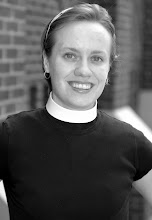How could I not blog on 9-11?
This year, I've read The End of Memory: Remembering Rightly in a Violent World, a book by Yale (and Episcopalian) theologian Miroslav Volf. Volf, while recognizing some of the merits of remembering wrongs, also explores the darker side of remembering wrongs committed. Remembering "rightly," he argues (or this is my take on what he said), doesn't necessarily mean forgetting. It does mean, as a Christian, not allowing the wrongs committed against us to become the center of our being and our identity. Otherwise, that whole "forgiveness" thing that Jesus not only offers to each of us but also asks that we forgive others as well (remember the Lord's Prayer?) is just a whole bunch of talk.
Now, I don't think that the United States is a Christian nation. I do think there are a lot of people who are Christians in policy making positions who perhaps are, in fact, allowing the events of 9-11 to shape our collective identity.
Rowan Williams, the Archbishop of Canterbury, who was actually in NYC at a conference at Trinity Wall Street on 9-11, wrote a relatively short but powerful work called Writing in the Dust that I recommend. He argues that the instinct to retaliate, to feel that release that comes from striking back may be human (see: the Psalms) and may make us feel better initially. However, that, he says, is not enough to justify doing so. He asks not only the more abstract theological questions about whether or not responding violently is the Christian thing to do; I don't think I would like the book if he left it there, honestly. Williams also asks the imminently practical questions, the things such as, "Will this action, whatever it is, lead us in the direction of fulfilling his goals?"
Today I am for praying, for those who have died, for those whose lives are changed forever, and for our enemies.
Subscribe to:
Post Comments (Atom)

No comments:
Post a Comment